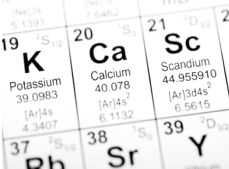Potassium (K)
 Potassium is another important macronutrient and has multiple roles in plant growth. It acts in concert with other nutrients in complex ways to the extent that we are still vague as to its exact functions. What we do know is that very specific deficiency symptoms occur when there is insufficient available to the plant.
Potassium is another important macronutrient and has multiple roles in plant growth. It acts in concert with other nutrients in complex ways to the extent that we are still vague as to its exact functions. What we do know is that very specific deficiency symptoms occur when there is insufficient available to the plant.
Excess soil levels of nitrogen, phosphorus, calcium and magnesium all inhibit plant uptake of potassium. Conversely, excess potassium is known to inhibit grass uptake of magnesium and cause staggers in cattle. These are yet more examples of why applying fertilisers without detailed soil analyses is an expensive mistake - mineral balance is all-important.
Most potassium is a component of the parent rock materials in the soil, such as feldspars and micas and only becomes plant available through weathering of the rocks, which is a slow process. For many European and American soils the process is too slow and the potash reserves inadequate for modern agriculture and regular applications of K fertiliser are needed to meet crop demands. The UK is generally better served and has richer reserves, though extra K is still needed in some areas. New potash resources have been discovered in Yorkshire recently - at least there is something we don't have to import!
